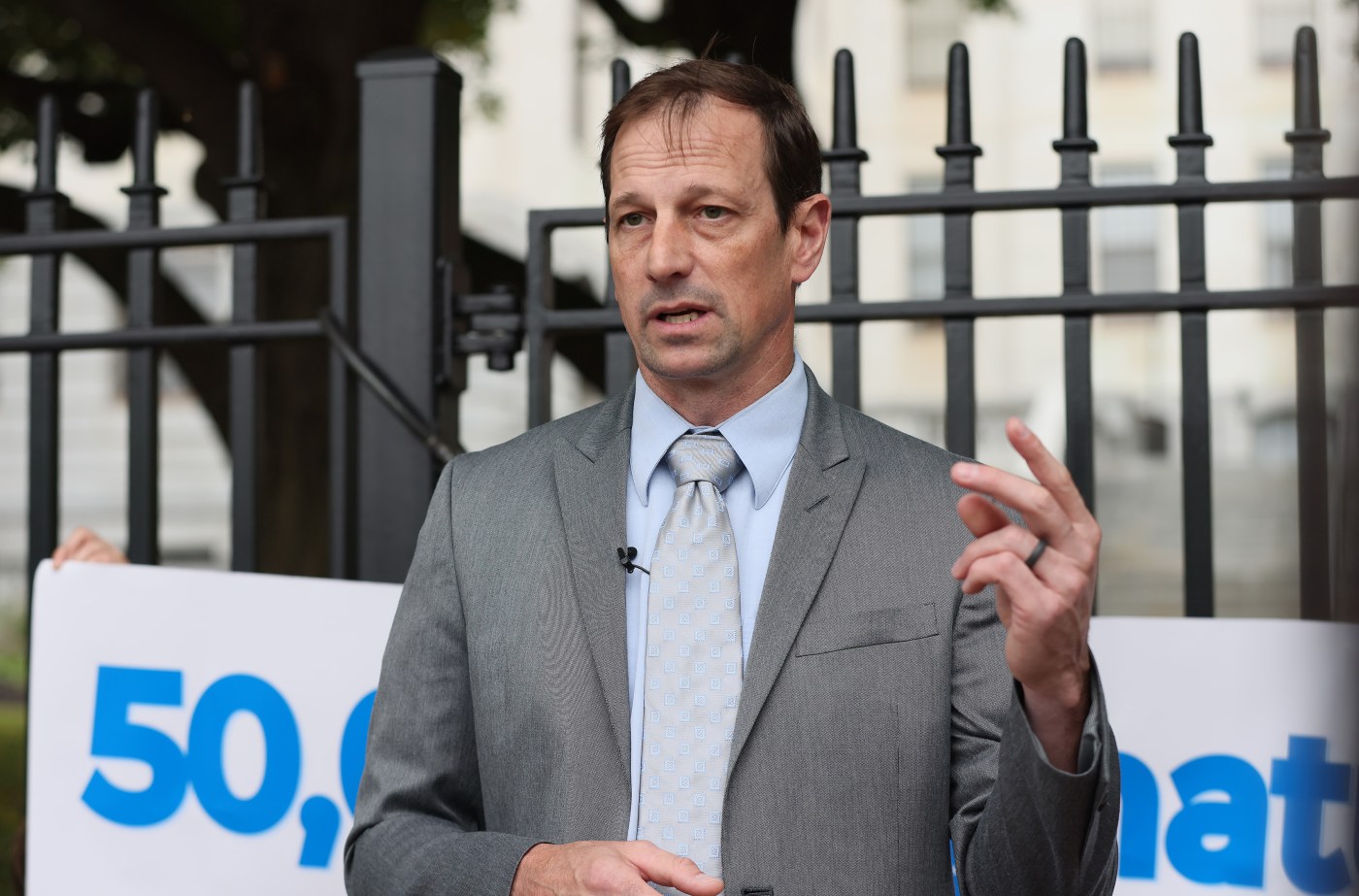
Massachusetts gun law repeal effort has half of necessary signatures to suspend statute
An effort to repeal a new gun law in Massachusetts has managed to secure roughly half of the signatures needed to immediately suspend the enforcement of the statute and place a question before voters in the 2026 election, according to a top organizer.
The campaign to strike down a law that — among many things — bans people under 21 from owning semiautomatic rifles or shotguns must collect more than 49,000 signatures from residents in Massachusetts by Oct. 9 to nullify the statute while the repeal process plays out over the next two years.
At a press conference outside the State House Thursday, Cape Gun Works co-founder Toby Leary said the organization behind the repeal, The Civil Rights Coalition, is “a little under halfway” to having enough signatures to suspend a law Gov. Maura Healey signed in July.
“We don’t have an exact number, but we have a long way to go,” Leary said. “Here’s the thing, if you’re pro-gun or anti-gun, what’s the problem with putting it on a ballot and asking the people to have two years to debate it? That’s something the Legislature didn’t afford us.”
More than 700 volunteers, 56 organizations, and 68 businesses, including sportsmen’s clubs and gun shops, are assisting the coalition in its mad dash to collect tens of thousands of signatures by early October, according to Leary.
Leary said the group has raised tens of thousands of dollars so far toward its initial goal of $200,000.
Beacon Hill Democrats experienced a strong backlash from gun rights groups, Second Amendment supporters, and the firearms industry after Healey signed the statute into law.
The proposal touches on a wide range of gun measures in the state, including licensing of firearms, firearm dealer inspections, carrying and transporting weapons, areas where carrying a firearm is prohibited, “assault-style firearms,” and large capacity feeding devices.
Legislators also signed off on a series of new training requirements for license-to-carry or firearms identification card applicant, including live fire and “disengagement” training. The measure also puts in place state training for local licensing authorities and online training for dealer applicants.
Democrats largely pitched the law as a way to keep people safe, gun ownership in check, and lower the number of incidents of gun violence.
Lawmakers also took aim at so-called “ghost guns” by requiring the serialization of all firearms and technology that turns semiautomatic weapons into fully automatic.
But critics said the statute goes too far and will end up punishing everyday gun owners.
“We want to let the people of Massachusetts know that they could wake up on Oct. 24 and be a felon having done nothing different other than now the government says that there’s a special type of gun that they can’t own,” Leary said, referencing the date the law will take effect pending the suspension effort. “There’s nothing special about these guns. They’re in common, ordinary use.”
Rep. Michael Day, a Stoneham Democrat and chief author of the law, did not immediately respond to a Herald inquiry.
Repeal campaigns over the past two-plus decades in Massachusetts have found little success and the effort to strike down the gun law is one of the only to seek an immediate suspension of the statute in question since 2000.
The last referendum on a state law to end in a repeal was in 1994, according to state data maintained by Secretary of State William Galvin’s office.
That campaign successfully beat back an effort to eliminate one of the two ways in which students could authorize fees to be assessed on tuition bills at state-operated colleges and universities to support nonpartisan student organizations that attempted to influence state legislation, according to a summary from the secretary of state’s office.
Related Articles
Revolution in the air: Massachusetts 250 initiative poised to be economic driver, Healey says
Healey does not say if state police should pause trainings at academy after recruit’s death
Dedham Democrat Djuna Perkins running for Norfolk County DA Michael Morrissey’s job
Pols & Politics: The money behind the effort to crack open Beacon Hill’s books
Cohasset Democrat ‘exploring’ bid for Norfolk DA Michael Morrissey’s job
There have been only two efforts to repeal state laws since 2000, according to state election data and a spokesperson for Galvin’s office. Both campaigns ultimately failed and neither sought a suspension of the law in question.
Opponents of a statute that granted people without lawful proof of presence in the United States a legal pathway to obtain a standard Massachusetts driver’s license lost their referendum campaign in 2022 with only 44% of the vote, state data shows.
Another effort in 2018 to strike down a transgender rights law that prohibited discrimination in public accommodations like bathrooms on the basis of gender identity, race, or sex lost after only securing 31% of the vote, according to state data.
A third referendum lost by wide margins in 1998 over a law that reworked the state’s electric utility industry in part by allowing customers to buy electricity from companies other than those which owned the power lines, according to state data.
The campaign to repeal and suspend this year’s gun law is only one attempt at erasing it from the state’s books.
The Gun Owners’ Action League, the local affiliate of the National Rifle Association, filed a lawsuit in August that challenges the statute’s provisions covering firearms licensing, including requirements for a license to carry and a firearms identification card.
Jim Wallace, the head of the group, argued the requirements violate the Second, Fifth, and Fourteenth Amendments to the U.S. Constitution.
But Wallace said his group’s lawsuit is only one opening salvo in a growing legal fight.
The same day Healey approved the law, the National Rifle Association pledged to challenge the 166-page statute in court. But a lawsuit has not yet been filed by the national group, according to the organization.
“This will probably take anywhere between five and 10 different federal court actions to address because the federal courts want to deal with a very specific subject matter, and this covers so many different subjects under the Second Amendment civil right that there really are almost not enough resources nationwide to take on the whole thing,” Wallace said outside the State House. “But we’re trying and national groups are stepping up to try to take a piece for us.”

